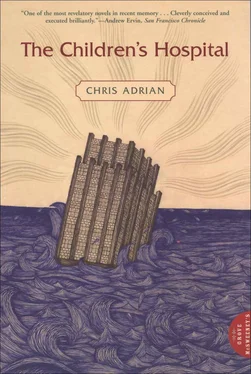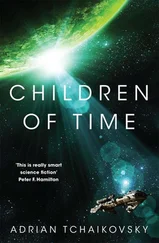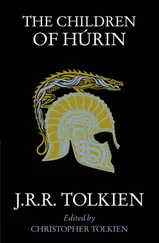
The botch was eating at Rob’s body, drying out his liver, hollowing cavitations in his spleen. Every time she touched him, Jemma pushed at it, but he became a little more degraded every day. Soon he had sores she could not wipe away, and a barking cough that sometimes brought black mud into his mouth, and he got harder and harder to wake from his dreamless sleep. It didn’t seem to bother him. He never complained about the cough, or said that his bones were hurting, though the black gall infiltrating his marrow was as plain to her as the nose on his face. That was getting misshapen, too, botch like fungus eating at his septum to give him the saddle-shaped nose of an ancient syphilitic.
“I feel great!” he always said, when she asked. She was in perfect health, but felt awful, perhaps, she thought, in sympathy to him. It was in her, too, she was sure, even though she couldn’t see it. She shouldn’t have had the pain in her wrists, or the cloudiness in her eyes, or the headaches, or the itchy rash on her bottom, not symptoms, either, of the pregnancy — two hundred and eighty days at sea and two weeks past her due date those were all backache and swollen feet and feeling eternally huge. And it wasn’t in her brain, so she had no excuse for all her strange and deplorable behaviors. She wasn’t crazy from the botch, not a feral Jemma, not senseless from disease, but still she excused herself on account of it, and drew on the excuse of weariness with the long struggle. I deserve to be a little crazy, she thought. Who wouldn’t be? There was no one to judge her, anyway — Rob lacked the faculties and Pickie had not woken in days — except Ishmael, who would hate her no matter what she did.
She did everything for her own comfort, excusing herself like a glutton feasting with a cold — I need this, she kept saying to herself, every time she looked at Rob, a little more decayed, silently suffering, happy as a retarded clam, still beautiful to her no matter how sick he got. She took to wearing hats plundered from the stock of happier times, Vivian’s pillbox and Monserrat’s beret and Dr. Snood’s bowler and Dr. Tiller’s beaddazzled cloth-and-leather headdresses. She’d put them on and hand out merit slips to the sleeping children, thinking she remembered just who had received how many demerits from Dr. Tiller, and keeping a pretend tally of how many she had yet to undo.
She made feasts she was too depressed to eat, set tables for lost holidays and imaginary holidays never to come, seated older kids at the table — some of them had become waxy and posable — and made Rob sing songs to them and eat food from all their plates. She made him pile babies on her in the nursery, spreading herself on the floor while he put them carefully on top of her in layers, until she lay quiet and still in a bubble of hot breath. She dressed them in fancy outfits and took them for stroller rides on the ramp, pretending it was years ago or years from now, that this was her baby asleep in the stroller, his chin on his chest, his feet bouncing as she rolled him through a different world or a new world. She started peeing in empty corners, or empty beds. In the middle of a nurses’ station or in the middle of a reconverted OR — the gleaming puddle on the sterile white floor was very satisfying.
She made Rob dance with her for hours at a time. The angel had an archive of songs that they couldn’t possibly exhaust, and she’d play them anywhere. The angel herself couldn’t sing worth a damn, but she had all the voices of the old world stored in the bowels of the hospital, and she’d recorded the survivors, secretly and not, at their own singing — Dr. Tiller’s stern “I Like Paris in the Springtime,” Dr. Sundae’s slow but passionate “Day by Day,” and Vivian’s “Do Right Woman,” which started out rather ferocious, but ended small and meek and sweet, too much like surrender to be at all like Vivian. It was Jemma’s favorite, in those last days. Rob seemed to like them all equally.
“I’m so happy,” he told her. They were dancing on the roof, in the faint, early shadow of the sycamore. She held him around the waist and pressed her face into his neck; his arms were over her shoulders, a hand placed on each of her shoulder blades. They rocked back and forth, foot to foot, the same old dance, not very different at all from the days when he was entirely alive.
“Me too,” she said. This was not how she had imagined they would spend their final days, and yet there was a sort of golden retirement glow over moments like this. They were lazy, and slow, and when they were in them she felt like they had nothing to do, and nowhere to go, and that they were just waiting, and would be waiting forever, for death to take them away together.
“I wish every day could be as pretty as this,” he said, though the day was no different from the last days and weeks; every morning started with fog, every afternoon was sunny and bright, every evening came at the end of a spectacular show of cloud. The air was always cool, not too salty, and clean-smelling, and every once in a while a strange odor came riding on her wind. It took her a whole week to realize it was the smell of land.
“They all can be,” she said. “They all will be.” But when she was thinking rationally she realized that she had no idea what was coming, and when she thought about how she had always been too afraid to imagine a future for them together, she wondered if that was why they weren’t going to have one now.
“Today I sat on a big bouncy ball,” he said. She said nothing, only held him a little tighter. She meant to let him go, just then, imagining a place on his back, a place to press that would release him. He would fall into all those parts again, and then they would crumble, while she watched, to ash. She would do something crazy — stuff her mouth with him, or spread him on her hair as she ripped her clothes. Then she would lie down and… she didn’t know what came next. It was like looking into the future and seeing another end of the world, all she could imagine coming afterward was blank white space, an emptiness that hurt just to think about. She held him tighter in her arms and tighter in her mind, sending a rush of fire through him — it was so subtle now, and so powerful, and still so useless.
“Why are you crying?” he asked her.
“Because I’m so happy,” she said.
“I’ll do it too!” he said, but she wouldn’t let him.
Two more times that day she felt almost ready to do it; during lunch she felt she could have reached out to press his nose and say, Enough. Then just as they were settling down for a nap, she made him lie down on her and put her hand again in the small of his back, her fingers settling on the button that would set him free. But when she thought of it, it didn’t seem like freedom, for his body to fall apart and dissolve. It just seemed like killing him.
So she drew his arm over her like a blanket, steadying it with her mind when she felt it loosen in the socket. He didn’t complain, but breathed softly against her neck and said it again—“I love you so much.” Never mind that he said it to Pickie Beecher, and the angel, and every replicator, and to twenty different flavors of ice cream. Now he was saying it to her, in his voice, and it was no effort at all to pretend like it was really him — it felt like him and sounded like him and smelled like him — that he was not dead, that it was ten weeks ago, or ten months ago. They lay in her little bed, due within the hour at the hospital for evening shifts, but reluctant — to the point of immobility — to move.
She slipped into a dream of him, hardly different, at first, than the reality — they were in bed, he was nestled against her back, an arm across her neck and another over her belly, his hand open against her, his palm centered over her belly button. It reminded her of the old dreams of her brother, where a sense of the extraordinary hovered over the most mundane activities; they played cards or washed dishes or she sat on the grass and watched him throw a lacrosse ball against the house and it was only just before she woke, or even after she woke, that she remembered that he was dead, and that this had been a visitation.
Читать дальше













